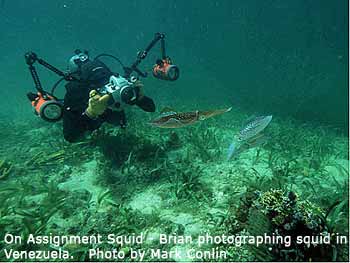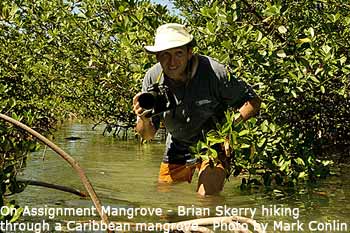|
Q. When / where did you start diving?
A. I began diving in 1977 and was certified in 1978 near my home in Massachusetts.
Q. What motivated you to become a diver?
A. I was drawn to the water from a very young age and was always fascinated by ocean documentaries. I'd have to say however, that the movies JAWS and The Deep (1975 and 1977) actually made me get certified though. I suppose most people were scared out of the water by JAWS, but it made me want to see sharks even more. I wanted to be Hooper!
Q. Where have you been, where are you going?
A. Well, I've been here and there over the years. I make my living as a photojournalist specializing in underwater subjects, so I've worked in some interesting places including, Australia, Mexico, French Polynesia, Ireland, France, Italy, The Bahamas, the Azores, Canada, the Norwegian Arctic, Venezuela and extensively throughout the Caribbean. I am currently working on several new stories for National Geographic Magazine that will have me in several locations within the pacific as well as South America.
Q. What diving accomplishment are you most proud of?
A. I am proud of a lot of the shipwreck explorations I did early in my career. I was fortunate to dive with some great divers back then on some challenging sites such as the Andrea Doria and many other newly discovered wrecks. I am also very pleased with the photo work I have been doing over the last 8 years for National Geographic Magazine. With the support of The Geographic I've been able to plan and photograph stories on subjects of great interest to me from natural history subjects such as harp seals, squid and sharks to stories about major environmental issues.
Q. What will the sport of diving be like 20 years from now?
A. I sure hope the oceans will be healthier twenty years from now than they are today and that people have recognized the value in protecting them. That said, I would think that equipment might become lighter and substantially more high-tech. New materials may emerge from which suits will be made that will work in a variety of environments. New generations of chips and miniaturization might create much more sophisticated dive computers. And of course imaging technology should continue to improve, so future divers will be able to record stills and motion pictures with smaller cameras and in lower ambient light.
Q. Who do you admire in the diving community?
A. There are a number of people that I admire within the diving community, but being a photographer I especially admire folks like Bill Curtsinger, Howard Hall, Al Giddings and Ernie Brooks. I guess I admire pretty much anyone that is more than 10 years older than me and still diving regularly and delivering the goods!!!
Q. Do you have any pre-dive, dive, or deco rituals?
A. I usually try to look all of my gear over, just to make sure everything is in good shape prior to a dive. I often open the tank valve, putting pressure to the regulator when I first get on the boat, allowing the hoses to sit with pressure in them for the ride out to the dive site. If something is going to blow I'd prefer it happens on the boat!
Q. Do you have any advice for a new drysuit diver?
A. I would advise making the switch to a drysuit as soon as possible, but to then take the time to become comfortable with it. Make a series of dives in a shallow, protected place and really learn how everything works. Determine exactly how much weight you need and exactly where everything feels comfortable. Once comfortable, gradually progress towards other dives.
Q. Do you know any good dive / fish jokes?
A. What lies on the bottom of the ocean and shakes? A Nervous Wreck
Q. Where can people find out more about you, your courses, and products?
A. On my website www.brianskerry.com
|




